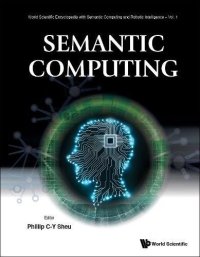
Ebook: Semantic Computing
Author: Phillip C.-y. Sheu
- Tags: Intelligence & Semantics, AI & Machine Learning, Computer Science, Computers & Technology, Robotics, Computer Science, Computers & Technology, Robotics & Automation, Industrial Manufacturing & Operational Systems, Engineering, Engineering & Transportation, Artificial Intelligence, Computer Science, New Used & Rental Textbooks, Specialty Boutique
- Series: World Scientific Encyclopedia With Semantic Computing and Robotic Intelligence
- Year: 2017
- Publisher: World Scientific Pub Co Inc
- Language: English
- pdf
Semantic computing, a rapidly evolving interdisciplinary field, seeks to structure, design, and manipulate computer content to better satisfy the needs and intentions of users and create a more meaningful user experience. This remarkable contributed work examines the art, engineering, technology, and applications of the field. Moreover, it brings together researchers from such disciplines as natural language processing, software engineering, multimedia semantics, semantic Web, signal processing, and pattern recognition in order to provide a single source that presents the state of the technology and points to new breakthroughs on the horizon.
Semantic Computing begins with an introduction that explores the concepts, technology, applications, and future of semantic computing. Next, the book is divided into four parts:
Part One: Semantic Analysis
Part Two: Semantic Languages and Integration
Part Three: Semantic Applications
Part Four: Semantic Programming and Interface
As readers progress through the book, they'll learn not only the underlying science, but also the fundamental technological building blocks of semantic computing. Moreover, they'll discover a variety of cross-disciplinary solutions to current computing and communication problems. Throughout the book, references to the primary literature enable further investigation of each individual topic.
Semantic Computing is ideal for industrial managers, researchers, and engineers seeking to design the next generation of computing systems in order to better meet user needs. It is also recommended as a textbook for senior undergraduate and graduate-level semantic computing courses.